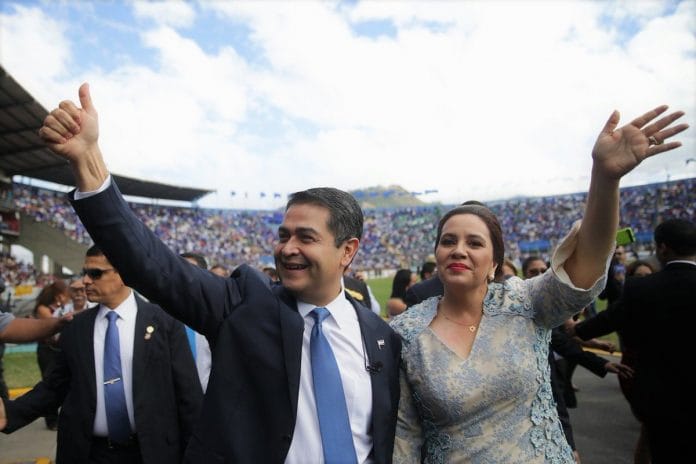A rigged presidency?
Juan Orlando Hernández has officially become President of Honduras, after a suspicious election in November last year, in which he mysteriously overtook his rival, Mr. Nasralla, after a blackout. This is his second term in office.
Protests against his election have been cruelly silenced: 32 people have been shot since November 26 for protesting his election. However, outside the Honduras, very few people seem to care, writes the Economist.
“The European Union, which also sent monitors, described the election as “well organised”. The Trump administration soon recognised Mr Hernández’s victory. The United States regards Mr Hernández, a tough-on-crime conservative, as an ally in its fight against drug-trafficking and migration from Central America. Some 500 American troops are stationed at the Soto Cano air base in central Honduras.”
“Most other countries in the Americas, including Argentina, Brazil, Canada and Mexico, also backed Mr Hernández. They dislike in general the idea of outsiders influencing countries’ domestic politics. “No government…wants to have their election process challenged in the international arena,” says an official at a Honduran NGO. That is especially true of the seven that are holding national elections in 2018, among them Brazil, Mexico and Colombia. Some Latin American leaders regard Mr Nasralla as a flaky leftist. The main exceptions to the regional rush to endorse Mr Hernández are the left-wing governments of Venezuela and Bolivia.”
Within the country too, the last remaining dissenters are packing up. “Mr Almagro has been the loudest dissenter, for good reason. He led international condemnation of Venezuela’s drift towards dictatorship; to bless Mr Hernández’s dubious victory would open him to charges that he is applying a double standard. The president’s friends accuse Mr Almagro of seeking publicity to run for Uruguay’s presidency in 2019,” the Economist writes.On
“January 22nd Mr Almagro appeared to give up the fight, saying the OAS would work “with the elected authorities”. Perhaps he was being prudent. But his surrender leaves the country’s battered democracy almost defenceless.”
Not just a local conflict
The new front could lead to a “broader Kurdish revolt that redraws the map”,writes Gareth Stansfield in The Guardian, warning that this new conflict could upset the entire region.
“The Kurds of Turkey could exploit an upsurge in Kurdish militancy and intensify their insurgency. Such a ramping up of Kurdish nationalism would also be evident in Iraq and Iran. With a rising insurgency beginning with the success – or even noble failure – of the defence of Afrin, a broader Kurdish revolt against their host states and allies is not beyond the realms of possibility.”
“This possible Kurdish domino would be transformative and unpredictable, even putting in play the very boundaries of the Middle East state system. There is also a further possible domino, already threatened by Afrin and of even greater concern to the west: its effect on the cohesion of Nato,” writes Stansfield.
“It’s time for the west finally to face an uncomfortable question – what is it that they want to achieve in the Middle East, beyond glib statements promoting peace, stability and democracy? Sure, it’s a fantastically difficult question, but it needs to be answered. In the absence of an answer, the events unfolding in Afrin, and what might follow, will continue to throw up consequences that can only benefit the interests of others.”
How Myanmar could still help the Rohingyas
“If Myanmar, also known as Burma, is to have any hope of preventing a further downward spiral to the crisis in Rakhine state and restoring its international reputation, immediate and dramatic changes are required,” writes Bill Richardson in the Washington Post.
“Myanmar is rightly facing tremendous international pressure to implement changes, but this does not justify the government’s siege mentality and its resistance to constructive criticism from an international community that wants to see Myanmar succeed in its efforts to establish peace and development in Rakhine and to entrench democratic norms.”
Richardson outlines three immediate steps: “First, Aung San Suu Kyi must establish her moral leadership on the Rakhine issue…Second, Myanmar must establish effective accountability mechanisms for perpetrators of violence…Finally, Myanmar must develop a strategy to deal with Rakhine that appropriately prioritizes and sequences among the recommendations of the Rakhine Advisory Commission.”
“Left unaddressed, the situation could quickly become an even bigger headache for Myanmar, the region and the world. In the short term, the repatriation process that Myanmar is racing to implement is sure to be symbolic at best: Provided returns are safe, voluntary and dignified, few refugees will go back to a country in which they have been violated, which does not respect their basic rights and which offers no means of redress for wrongs. That leaves a large, destitute and aggrieved population just across the border in Bangladesh that is susceptible to radicalization. For the sake of its own interests and those of the region, Myanmar must immediately correct course and recognize that the international community wants to help it to do so,” he writes.






